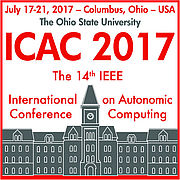Call-for-Participation: 14th IEEE International Conference on Autonomic Computing

Wednesday, June 7, 2017 13:42
ICAC 2017 will be held in Columbus, Ohio, USA on July 17-21, 2017.
http://icac2017.ece.ohio-state.edu/
ICAC is the leading conference on autonomic computing, its foundations, principles, engineering, technologies, and applications. Nowadays, complex systems of all types, like large-scale data centers, cloud computing infrastructures, cyber-physical systems, the internet of things, self-organizing systems, organic computing systems, cognitive computing systems, or self-aware computing systems, are increasingly complex, involving many active, interconnected components requiring careful coordination. Being impossible for a human to manage such systems, the autonomic computing paradigm with its support for self-management capabilities becomes increasingly indispensable for the components of our IT world.
The conference seeks latest research advances on science and engineering concerning all aspects of autonomic computing, including but not limited to the following main research topics:
Foundations
a. Fundamental science and theory of autonomic computing systems and feedback control for software, self-awareness and self-expression b. Algorithms, such as AI, machine learning, control theory, operations research, probability and stochastic processes, queueing theory, rule-based systems, biological-inspired techniques, and socially-inspired techniques c. Formal models and analysis of self-management, emergent behavior, uncertainty, self-organization, self-awareness, trustworthiness
Resource Management in Data Centers
a. Hypervisors, operating systems, middleware, and platforms for self-managing data centers and cloud infrastructures b. Sensing, energy efficiency, and resource adaptation c. Autonomic components, such as multi-core servers, storage, networking, and hardware accelerators d. Applications and case studies of end-to-end design and implementation of systems for resource management
Cyber-Physical Systems (CPS) and Internet of Things (IoT)
a. System architectures OS, services, middleware, and protocols for CPS and IoT b. Energy, real-time, and mobility management c. Design principles, methodologies, and tools for CPS and IoT d. Self-organization under severe resource constraints e. Applications and case studies of autonomic CPS and IoT
Self-Organization and Organic Computing
a. Self-organization principles and organic computing principles borrowed from systems theory, control theory, game theory, decision theory, social theories, biological theories, etc. b. Self-organization, emergent behavior, decentralized control, individual and social/organizational learning, scalability, robustness, goal- and norm-governed behavior, online self-integration for trustworthy self-organizing and organic systems c. Infrastructures and architectures for self-organizing systems and organic computing systems d. Applications and case studies for self-organization and organic computing
Emerging Computing Paradigms: Cognitive Computing, Self-Aware Computing
a. Advanced learning for cognitive computing such as meta-cognitive learning, self-regulatory learning, consciousness and cognition in learning, collaborative/competitive learning, and online/sequential learning b. Architectures, control, algorithmic approaches, instrumentation, and infrastructure for cognitive computing and self-aware systems c. Cognitive computing and self-awareness in heterogeneous and decentralized systems d. Applications and case studies for social networks, big data systems, deep learning systems, games, and artificial assistants, cognitive robots, and systems with self-awareness and self-expression
Software Engineering for Autonomic Computing Systems: Architecture, Specifications, Assurances
a. Design methodology, frameworks, principles, infrastructures, and tools for development and assurances for autonomic computing systems b. System architectures, services, components and platforms broadly applicable for autonomic computing system engineering c. Goal specification and policies, modeling of service-level agreements, behavior enforcement, IT governance, and business-driven IT management d. Applications and case studies for software engineering approaches for autonomic computing systems
We will award the Karsten Schwan Best Paper Award to a full research paper and it is planned that a selection of the best papers of the full research paper category will be invited to submit an extended version of their contribution for a ICAC 2017 special issue after the conference.
Conference organization
In cooperation with USENIX and SPEC.
Conference Patrons: NSF, Google, Huawei, Microsoft.
Program
A preliminary version is available at http://icac2017.ece.ohio-state.edu/program/program.
Keynotes
- Dr. Nelly Bencomo, Aston University, UK
- Mr. Mark Patton, Vice President of the Columbus Smart Cities Initiative, USA
- Prof. Ragunathan Rajkumar, Carnegie Mellon University, USA
- Dr. John Wilkes, Principal Software Engineer, Technical Infrastructure, Google, USA
http://icac2017.ece.ohio-state.edu/program/keynotes.
Workshops
- 2nd Models@run.time
- 2nd SeAC: Workshop on Self-Aware Computing
- 12th FC: Workshop on Feedback Computing
- 2nd SOSeMC: Self-Organizing Self-Managing Clouds Workshop